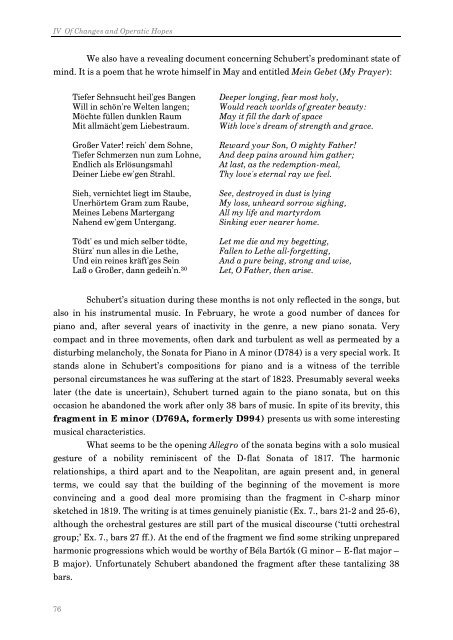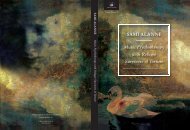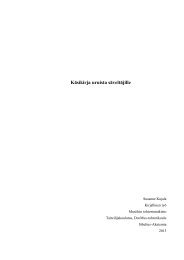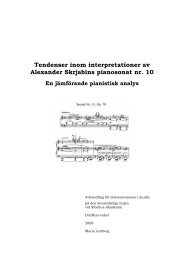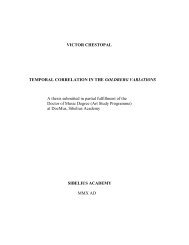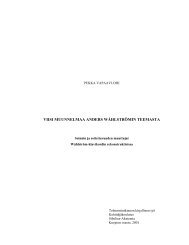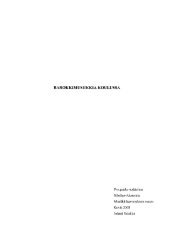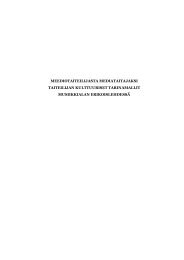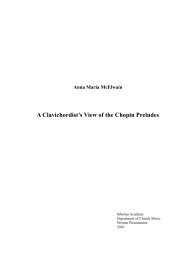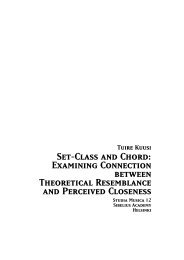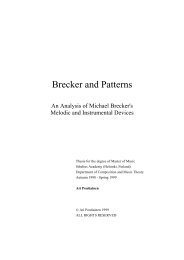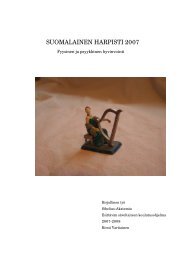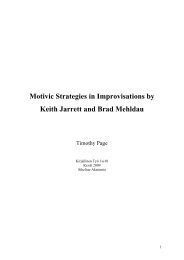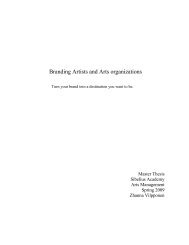The Unfinished Piano Sonatas of Franz Schubert Javier ... - Ethesis
The Unfinished Piano Sonatas of Franz Schubert Javier ... - Ethesis
The Unfinished Piano Sonatas of Franz Schubert Javier ... - Ethesis
You also want an ePaper? Increase the reach of your titles
YUMPU automatically turns print PDFs into web optimized ePapers that Google loves.
IV Of Changes and Operatic Hopes<br />
76<br />
We also have a revealing document concerning <strong>Schubert</strong>’s predominant state <strong>of</strong><br />
mind. It is a poem that he wrote himself in May and entitled Mein Gebet (My Prayer):<br />
Tiefer Sehnsucht heil'ges Bangen<br />
Will in schön're Welten langen;<br />
Möchte füllen dunklen Raum<br />
Mit allmächt'gem Liebestraum.<br />
Großer Vater! reich' dem Sohne,<br />
Tiefer Schmerzen nun zum Lohne,<br />
Endlich als Erlösungsmahl<br />
Deiner Liebe ew'gen Strahl.<br />
Sieh, vernichtet liegt im Staube,<br />
Unerhörtem Gram zum Raube,<br />
Meines Lebens Martergang<br />
Nahend ew'gem Untergang.<br />
Tödt' es und mich selber tödte,<br />
Stürz' nun alles in die Lethe,<br />
Und ein reines kräft'ges Sein<br />
Laß o Großer, dann gedeih'n. 30<br />
Deeper longing, fear most holy,<br />
Would reach worlds <strong>of</strong> greater beauty:<br />
May it fill the dark <strong>of</strong> space<br />
With love's dream <strong>of</strong> strength and grace.<br />
Reward your Son, O mighty Father!<br />
And deep pains around him gather;<br />
At last, as the redemption-meal,<br />
Thy love's eternal ray we feel.<br />
See, destroyed in dust is lying<br />
My loss, unheard sorrow sighing,<br />
All my life and martyrdom<br />
Sinking ever nearer home.<br />
Let me die and my begetting,<br />
Fallen to Lethe all-forgetting,<br />
And a pure being, strong and wise,<br />
Let, O Father, then arise.<br />
<strong>Schubert</strong>’s situation during these months is not only reflected in the songs, but<br />
also in his instrumental music. In February, he wrote a good number <strong>of</strong> dances for<br />
piano and, after several years <strong>of</strong> inactivity in the genre, a new piano sonata. Very<br />
compact and in three movements, <strong>of</strong>ten dark and turbulent as well as permeated by a<br />
disturbing melancholy, the Sonata for <strong>Piano</strong> in A minor (D784) is a very special work. It<br />
stands alone in <strong>Schubert</strong>’s compositions for piano and is a witness <strong>of</strong> the terrible<br />
personal circumstances he was suffering at the start <strong>of</strong> 1823. Presumably several weeks<br />
later (the date is uncertain), <strong>Schubert</strong> turned again to the piano sonata, but on this<br />
occasion he abandoned the work after only 38 bars <strong>of</strong> music. In spite <strong>of</strong> its brevity, this<br />
fragment in E minor (D769A, formerly D994) presents us with some interesting<br />
musical characteristics.<br />
What seems to be the opening Allegro <strong>of</strong> the sonata begins with a solo musical<br />
gesture <strong>of</strong> a nobility reminiscent <strong>of</strong> the D-flat Sonata <strong>of</strong> 1817. <strong>The</strong> harmonic<br />
relationships, a third apart and to the Neapolitan, are again present and, in general<br />
terms, we could say that the building <strong>of</strong> the beginning <strong>of</strong> the movement is more<br />
convincing and a good deal more promising than the fragment in C-sharp minor<br />
sketched in 1819. <strong>The</strong> writing is at times genuinely pianistic (Ex. 7., bars 21-2 and 25-6),<br />
although the orchestral gestures are still part <strong>of</strong> the musical discourse (‘tutti orchestral<br />
group;’ Ex. 7., bars 27 ff.). At the end <strong>of</strong> the fragment we find some striking unprepared<br />
harmonic progressions which would be worthy <strong>of</strong> Béla Bartók (G minor – E-flat major –<br />
B major). Unfortunately <strong>Schubert</strong> abandoned the fragment after these tantalizing 38<br />
bars.


